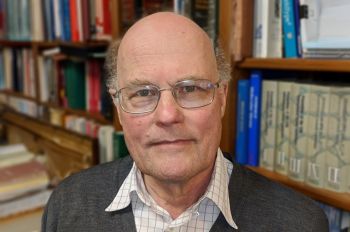“We Have Done a Good Thing”—Professor Emeritus and Former Chair of Chemistry Walter Eisenberg Looks Back on the History of the Professional Master’s Program in Analytical Chemistry
On March 6 in the Robert A. Pritzker Science Center Auditorium, more than 60 people joined the Department of Chemistry to celebrate the 20th Anniversary of the Professional Master’s program in Analytical Chemistry. Walter Eisenberg, professor emeritus and former chair of chemistry, was awarded a service excellence award for his vision in founding the successful program 20 years ago, to better prepare chemistry graduates for their place in the workforce, and close the gap between technical people and senior management in industry.
Back in 1996, this was the first professional master’s program of its kind. Eisenberg explained that when they started—in the incubator stage—there were hardly any other courses online. “It is great that we are celebrating this success for IIT… we have produced a generation of analytical chemists that are more knowledgeable and skilled.” From its early start on the Illinois Tech/TV network, the program later moved online, and continued to improve with the guidance of current Director Diep Nguyen and the advisory committee, growing to a steady enrollment of 50 students from all over the country.
Tara Nylese, a 2012 graduate who returned for the event, is now a manager for EDAX Global Applications, and gave this advice to the students: “If you are not doing what you love, change gears. Once you find that [what you love] stick to it and be steadfast.” Nylese showed the audience how physical characterization, as well as quantitative analysis and spectroscopy fit into her corporate work.
David Boldridge, lecturer and advisory board member, gave an industrial chemist’s perspective, as he occasionally hires new graduates at Cabot Microelectronics. He argued that whether a formulator, R&D analyst, or in quality control, technical service, sales, or manufacturing and operations, each of these industry-specific areas require a certain skill set for fast results, for which recent graduates have only been given an introduction. He said the analytical chemistry master’s degree builds expertise in a very focused and rapid way.
Alumnus Chris Latoz, now a manager of stability and analytical services at Hollister Inc., spoke about how he met Eisenberg in 1995, in organic chemistry, and joked about their challenging nearly 2000-page textbook. He remembered Eisenberg’s great, clear teaching style. The program, he said, required 20 hours’ time commitment on top of the 40-plus work-week hours. But the dedication paid off and in December 1998, Latoz was in the first graduating class.
Members of the chemistry department were able to use this event to express their deep appreciation for Eisenberg’s service. Eisenberg recalled how years ago one student told him: “You have given me my life back,” removing a 50-mile commute to her university and creating more family time with the online lectures to view at home. “That is the beauty of the program,” Eisenberg remarked. “We have done a good thing.”
Carlo Segre, interim chair, honors Walt Eisenberg with a service excellence award from the Department of Chemistry.




